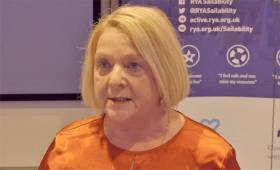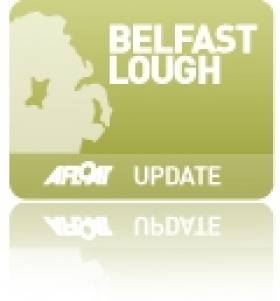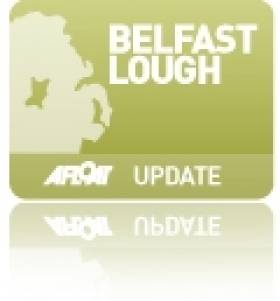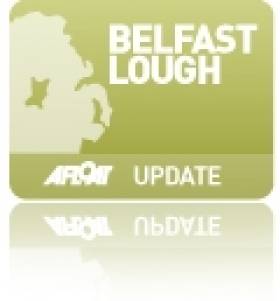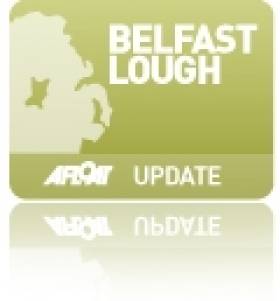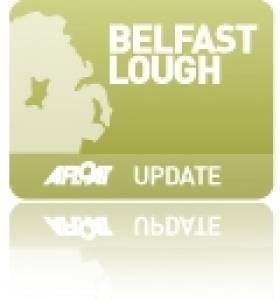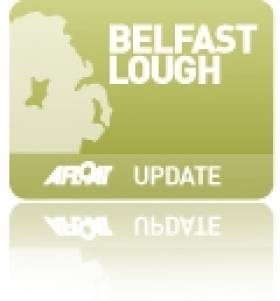Displaying items by tag: Belfast Lough Sailability
Belfast Lough Sailability Celebrates Successful President’s Cup This Autumn
Belfast Lough Sailability has had a lot to celebrate in recent months with sailors taking part in the 2022 President’s Cup, Hansa Irish Championships and 2.4mR Irish Nationals.
In August, Belfast Lough Sailability hosted the 2022 President’s Cup which incorporated the Hansa Irish Championships and 2.4mR Irish Nationals. The event was organised in partnership with Carrickfergus Sailing Club, with significant planning, sponsorship and organisation required.
The President’s Cup is the only event of its kind where people with disabilities and able-bodied sailors sail together in competition and the helm of each boat must have a disability.
The event has representation from the four provinces across Ireland. Team Ulster consisted of competitors from Belfast Lough Sailability, Foyle Sailability and Lough Erne Sailability.
With favourable weather conditions, the 47 competitors across 25 boats were able to showcase their skills gained through training and delivered a colourful and eventful spectacle for supporters and spectators.
 Boats at Carrickfergus Sailing Club which co-hosted the 2022 President’s Cup with Belfast Lough Sailability
Boats at Carrickfergus Sailing Club which co-hosted the 2022 President’s Cup with Belfast Lough Sailability
Racing was competitive, with Team Ulster successfully retaining the 2022 President’s Cup. The region also hailed success in the Hansa Irish Championships, with Sophie McClenaghan of Belfast Lough Sailability taking the Best Girl Helm (U18) trophy and Willie J Thompson (also Belfast Lough Sailability) the boys’ equivalent. Meanwhile, Belfast Lough’s John Patrick took first place in the 2.4mR Irish Nationals.
David Todd, chair of Belfast Lough Sailability said: “Sailing is an activity that is enjoyed by a variety of people but is not readily accessible to most of the community and certainly not to those members of the community with disabilities.
“Belfast Lough Sailability, based at Carrickfergus, Co Antrim, offers access to the sea to those in the community who would not normally have that opportunity and promotes equality of opportunity by providing education and training to people with disabilities in a safe and enjoyable environment.”
The spokesperson added: “This was a very successful event but it’s not all about winning. The benefits of having the opportunity to participate in an event representing your province or in a national event are far reaching for each participating individual. Competitors — both helms and crew — will benefit from increasing their skills through training and education to sail competitively. This includes significant positive impact on each individual’s confidence and self-esteem.
“They will aspire to represent their club, county, province and country at other levels of competition. They will also inspire others with disabilities and from disadvantaged backgrounds to participate in the healthy sport of sailing; and to undergo training and education to increase their skills.”
Belfast Lough Sailability Recognised For ‘Exceptional Contribution’ In RYA Awards
#Sailability - Anne Taylor of Belfast Lough Sailability was one of three winners of this year’s Exceptional Contribution Awards in the RYA Sailability Annual Awards last weekend.
Held at the Sailability National Conference and Awards dinner at Wyboston Lakes on Saturday (16 February) — with more than 160 delegates representing 57 sailability sites across the UK in attendance — the awards recognised individuals and organisations whose contribution and achievements have made a real impact.
The Exceptional Contribution Awards are presented each year individuals who, over a considerable period have shown exceptional commitment and dedication to boating and getting people on the water.
Belfast Lough’s Anne Taylor said: “My son had a very serious illness and we were very lucky that he made a full recovery. He may not have and if he hadn’t, he would have needed something like sailability to keep his spirits going.
“I’m absolutely delighted to have won this award, I think it’s excellent for our group, Belfast Lough, and for raising the profile of sailability in general.”
A new award this year was the #MoreThanSailing Award, recognising a new and innovative project, activity or piece of work that has enabled inactive disabled people to become more active. The first ever recipient was Jon Gamon and the SEAS Sailability group at the Conway Centres in Anglesey, North Wales.
Jon Gamon commented: “It’s great to take this award back to North Wales, setting up the SEAS Sailability group has been a real community effort, there’s been lots and lots of people involved and to be able to take this back to the Conway Centres and show everyone, they’ll all be really proud. It means such a lot, it’s amazing.”
RYA sailability manager Joff McGill added: “Congratulations to all of this year’s award winners. The Sailability Annual Awards recognise the dedication, commitment and contribution of so many, but of course it’s way more than that, there are so many other people who have given so much and we’re just recognising a few of them.”
Boat Naming Ceremony for Carrickfergus-Based Disabled Sailing Charity, Belfast Lough Sailability
#sailability – Weather presenter Cecilia Daly performed a weather-themed boat naming ceremony at Carrickfergus at the weekend for a new member of the Belfast Lough Sailability flotilla which was funded by The Lloyds Bank Foundation for Northern Ireland, and Sainsburys. The yellow-decked, orange-sailed Hansa 303 was appropriately named Sunny.
Belfast Lough Sailability is the Carrickfergus-based charity that trains, educates and encourages people with disabilities, on the water, in sailing boats, motor boats and kayaks
Next summer, with assistance from Carrickfergus Marina and Carrickfergus Sailing Club, "BLS" will host the Hansa 303 Irish Championship for sailors with disabilities – August 1 & 2.
New Year Honour for NI 'Sailability' Stalwart
#BelfastLough - A former vice chair of Belfast Lough Sailability made Britain's New Year Honours list for her services to sailing for people with disabilities.
As the Carrick Times reports, Geraldine Duggan will receive a British Empire Medal for her work with the Northern Ireland sailing charity, which relies on the generosity of the public to provide its services - which include getting more than 40,000 people with disabilities out on the water in 2013 alone.
Three years ago that generosity resulted in a £50,000 windfall from the Big Lottery Fund's People's Millions award, which funded the purchase of a Sea Rover boat that allows direct access for wheelchair users.
The Carrick Times has more on the story HERE.
RYA Volunteer Awards for Belfast Lough Sailors
#RYAAwards - Two sailors from Northern Ireland have received awards from the Royal Yachting Association for their voluntary work, as the Carrickfergus Times reports.
Belfast Lough locals Sheela Lewis from Whitehead received Karl Blythe from Carrickfergus were among 56 people commended by Britain's Princess Royal at the RYA Volunteer Awards in London recently.
Lewis, the first female commodore of the County Antrim Yacht Club, was presented with the Lifetime Commitment Award for her hard work in developing the small club's sailing courses.
And Blythe was nominated by Belfast Lough Sailability for the Youth Award for his dedication to helping others get into sailing and promoting the club online, even while facing the challenges of his autism spectrum disorder.
“I really enjoy helping out with Belfast Lough Sailability and don’t think I do anything more special than any other volunteer," said the 19-year-old. "I really enjoy getting involved, not only with the sailing and on-the-water activities but also helping behind the scenes."
#BELFAST LOUGH NEWS - Belfast Lough Sailability was selected to host the Irish Paralympic Sailing Team for their pre-event training last weekend from 28 June to 1 July.
According to a spokesperson, the move "definitely puts Carrickfergus Marina and the Borough of Carrickfergus on an international platform with regard to elite sailing" - and comes after a call to the public to vote for the disabled sailing charity in the UK's National Lottery Awards.
It also provided a much-needed boost to the area after the recent fire that destroyed Carrickfergus Sailing Club.
The combination of state-of-the-art facilities at Carrickfergus Marina and the expertise of staff at Belfast Lough Sailability ensured that the Irish athletes had an exciting and challenging training camp ahead of the Paralympic Games, which take place after the London Olympics later this summer.
Belfast Lough Sailability said their hosting of the team "acknowledges that Carrickfergus is capable of offering access for training at the highest level of sailing competition for the disabled".
The paralympians were also wished great success in their campaign by Miss Northern Ireland Tiffany Brien, who happens to be an Olympic Class sailor and ambassador for Belfast Lough Sailability.
Jim Boyd, chair of Belfast Lough Sailability, said: “I believe that this is only the start, and potentially teams from further afield will be using our combined expertise to train in the best sailing waters in the UK, at a five-anchor marina already strongly committed to supporting disabled sailing.
"In partnership with Carrickfergus Borough Council, Belfast Lough Sailability are now recognised as leaders in sailing for people with disability and together we can go from strength to strength.”
#BELFAST LOUGH NEWS - The Carrick Advertiser reports that disabled sailing charity Belfast Lough Sailability has has won a place in the semi-finals of the UK's National Lottery Awards 2012.
Voting opened yesterday in the annual scheme, and the group - one of only 10 projects to make it through in the Best Sports Project category - is calling on the public for its support.
The news comes a year after the charity received £50,000 from the Big Lottery Fund's People's Millions award which enabled the funding of the Sea Rover, a specially adapted vessel with a drop-down bow that enables access for wheelchair users.
More recently, as reported on Afloat.ie, the group added the Hawk 20 keel boat to its fleet which can take up to six for experience on the water.
Geraldine Duggan, chair of Belfast Lough Sailability said: "We're delighted to have reached the semi-finals of The National Lottery Awards and it's a superb acknowledgement for our staff and volunteers.
“With National Lottery funding, Belfast Lough Sailability was able to branch out, diversify and offer so much more to the community. We are a small organisation but we make a huge difference to the lives of those living with disability."
The Carrick Advertiser has more on the story HERE.
Belfast Lough Sailability Names Latest Vessel in its Fleet
#BELFAST LOUGH NEWS - The Hawk 20 was officially named in a ceremony hosted by Belfast Lough Sailability last weekend.
The Carrick Times reports that the disabled sailing charity's latest vessel can take up to six for experience on the water.
“The Hawk has a roomy comfortable cockpit and is a stable sailboat well suited for the task of taking people with disability out on the water," said Christine Harper, the charity's hon secretary.
The keel boat is set to join the other specially adapted vessels in the fleet for Belfast Lough Sailability's regular Wednesday evening sessions from Carrickfergus Sailing Club.
Those boats include the unique Sea Rover, a drop-down bow vessel which was funded with £50,000 from the Big Lottery Fund's People's Millions award, as voted for by the general public in 2010.
The weekly sailings are open to everyone with a disability, their carers or family members.
Belfast Lough Sailability Launches New Sea Rover
Belfast Lough Sailability recently introduced the latest addition to its fleet - thanks to the generosity of the Northern Irish public.
The Sea Rover was funded with £50,000 from the Big Lottery Fund's People's Millions award, as voted for by the general public last year.
The unique vessel features a drop-down bow to enable direct access for wheelchair users, as well as an integral crew hoist to assist boarding.
The charity said: "Belfast Lough Sailability continues to push the boundaries to offer people with a disability, their families and carers the opportunity to get out on the water and enjoy a range of activities, which would not normally be available to them."
Belfast Lough Sailability Bids for People's Millions
NI sailing charity Belfast Lough Sailability has been shortlisted for the finals of The People’s Millions award.
The People’s Millions is a partnership between the Big Lottery Fund and ITV through which the public decides which local community projects will get up to £50,000 of UK National Lottery funding.
Voting begins at 9am on Wednesday 24 November when anyone in Northern Ireland and across the UK can vote for a wide range of worthy causes.
Winning the People's Millions award would allow the Carrickfergus-based disabled sailing charity to purchase a wheelchair accessible Sea Rover safety boat.
This would enable Belfast Lough Sailability to provide full on-the-water support from the sailors’ carers and families, as well as a stable wheelchair-friendly platform from which to coach.
Friends and fans of the charity can show their support by sharing the special Facebook page or registering on the People's Millions website.


























